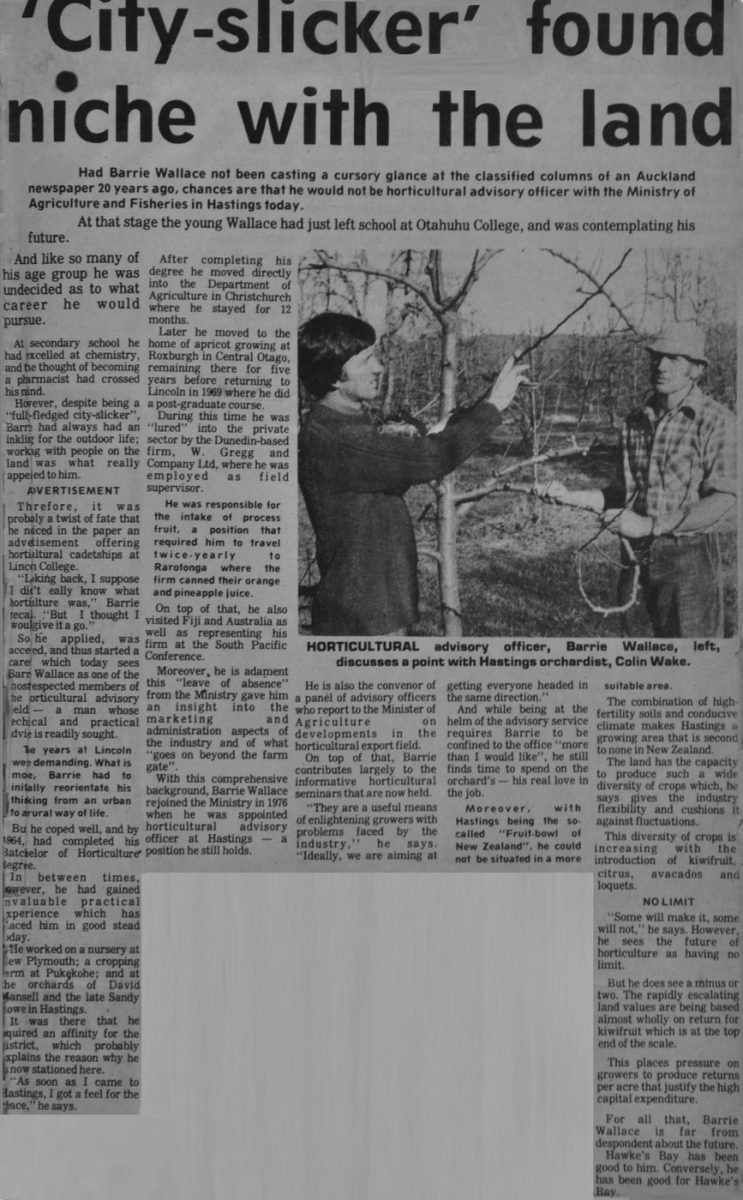‘City slicker’ found niche with the land
Had Barrie Wallace not been casting a cursory glance at the classified columns of an Auckland newspaper 20 years ago, chances are that he would not be horticultural advisory officer with the Ministry oi Agriculture and Fisheries in Hastings today.
At that stage the young Wallace had just left school at Otahuhu College, and was contemplating his future.
And like so many of his age group he was undecided as to what career he would pursue.
At secondary school he excelled at chemistry and the thought of becoming a phamacist had crossed his mind.
However, despite being a ‘fully-fledged city-slicker, Barry [Barrie] had always had an inkling for the outdoor life; working with people on the land was what really appealed to him.
ADVERTISEMENT
Therefore, it was probably a twist of fate that he noticed in the paper an advertisement offering horticultural cadetships at Lincoln College.
“Looking back, I suppose I really didn’t know what horticulture was,” Barrie recalled. “But I thought I would give it a go.”
So he applied, was accepted, and thus started a career which today sees Barry [Barrie] Wallace as one of the most respected members of the horticultural advisory field – a man whose technical and practical advice is readily sought.
The years at Lincoln were demanding. What is more, Barrie had to initially reorientate his thinking from an urban to a rural way of life.
But he coped well, and by 1964, had completed his Batchelor [Bachelor] of Horticulture degree.
In between times, however, he had gained invaluable practical experience which has placed him in good stead today.
He worked on a nursery in New Plymouth; a cropping farm at Pukekohe; and at the orchards of David Mansell and the late Sandy Lowe in Hastings.
It was there that he acquired an affinity for the district, which probably explains the reason why he is now stationed here.
“As soon as I came to Hastings, I got a feel for the place,” he says.
After completing his degree he moved directly into the Department of Agriculture in Christchurch where he stayed for 12 months.
Later he moved to the home of apricot growing at Roxburgh in Central Otago, remaining there for five years before returning to Lincoln in 1969 where he did a post-graduate course.
During this time he was “lured” into the private sector by the Dunedin firm, W. Gregg and Company Ltd, where he was employed as field supervisor.
He was responsible tor the intake of process fruit, a position that required him to travel twice-yearly to Rarotonga where the firm canned their orange and pineapple juice.
On top of that, he also visited Fiji and Australia as well as representing his firm at the South Pacific Conference.
Moreover, he is adament this “leave of absence” from the Ministry gave him an insight into the marketing and administration aspects of the industry and of what “goes on beyond the farm gate”.
With this comprehensive background Barrie Wallace rejoined the Ministry in 1976 when he was appointed horticultural advisory officer at Hastings – a position he still holds.
He is also the convenor of a panel of advisory officers who report to the Minister of Agriculture on developments in the horticultural export field.
On top of that, Barrie contributes largely to the informative horticultural seminars that are now held.
“They are a useful means of enlightening growers with problems faced by the industry,” he says. “Ideally, we are aiming at getting everyone headed in the same direction.”
And while being at the helm of the advisory service requires Barrie to be confined to the office “more than I would like”, he still finds time to spend on the orchards – his real love in the job.
Moreover, with Hastings being the so-called “Fruit-bowl of New Zealand”, he could not be situated in a more suitable area.
The combination of high fertility soils and conducive climate makes Hastings a growing area that is second to none in New Zealand.
The land has the capacity to produce such a wide diversity of crops which, he says gives the industry flexibility and cushions it against fluctuations.
This diversity of crops is increasing with the introduction of kiwifruit, citrus, avacados [avocados] and loquets [loquats].
NO LIMIT
“Some will make it, some will not.” he says. However, he sees the future of horticulture as having no limit.
But he does see a minus or two. The rapidly escalating land values are being based almost wholly on return for kiwifruit which is at the top end of the scale.
This places pressure on growers to produce returns per acre that justify the high capital expenditure.
For all that, Barrie Wallace is far from despondent about the future.
Hawke’s Bay has been good to him. Conversely, he has been good for Hawke’s Bay.
Photo caption – Horticultural advisory officer, Barrie Wallace, left, discusses a point with orchardist, Colin Wake.












Do you know something about this record?
Please note we cannot verify the accuracy of any information posted by the community.